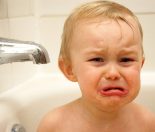This Kiwi Families article provides an allergies overview and also provides a practical overview on coping with allergies in children.
What are allergies?
An allergy is a response by the immune system to a specific food or substance – it causes the immune system to overreact to a normally harmless substance and trigger a variety of responses in the body.
There are a huge variety of allergies – from food to dust mites, pollens, chemicals, drugs, fleabites and bee stings. What causes some children to develop allergic reactions is often unknown, though in other families there is a line of allergic reactions stretching back generations.
A history of eczema, asthma, hay fever, hives or recurrent ear infections in parents or other family members may increase the chance of a child developing an allergy. However Allergy New Zealand explains that even if parents have no allergies, there is still a 5 – 15% chance that a child may develop one. If one parent has allergies this risk factor increases to 25%; if both parents have the same allergic disease then a child is at 80% risk of suffering from the same allergy.
Allergies have become a global phenomenon. A 2003 study done at the University of Auckland found the Asia-Pacific region was noted for the prevalence of asthma, hay fever and eczema in all age groups of children.
The problem is definitely one that affects Kiwi children. It has been estimated that 40 – 50% of New Zealanders suffer some form of allergy. In 1998, Allergy New Zealand received 7500 calls for help – by 2002 that number had grown to 100,000 annually.
Many theories are postulated as to the growing incidence of allergies in the modern world:
- Some believe modern foods that are highly processed and filled with chemicals are at the root of the problem
- Others say that modern children are being kept too clean and therefore becoming more allergic when they encounter common substances
- Some link allergies to childhood vaccinations
- Or children being given antibiotics in the first year of life
- Another thought is modern homes with thick carpets are a causative factor as dust mites thrive in these environments
- Some countries seem to have a much higher incidence of allergies than others
- Others point to a world becoming ever more filled with Xenoestrogens – chemical disrupting compounds that are now found everywhere from the fat of an Arctic polar bear to quiet English estuaries.
Common allergic substances
- Food – most commonly peanuts, shellfish, fish, dairy products, eggs, wheat, soy
- Moulds
- Pollens from plants, grass, trees
- Dust mite faeces
- Insects – flea bites, ant bites, cockroach droppings, bee and wasp stings
- Animals – cats, dogs, birds
- Rubber
- Drugs – especially antibiotics
- Chemicals – household cleaners, oven sprays, laundry detergents
What are the signs and symptoms of allergies?
These vary according to the type of allergy. General allergic reactions to watch out for:
- Red welts on the skin
- Skin rashes
- Itching in the mouth
- Eczema
- Swelling
- Colic
- Vomiting
- Diarrhoea or constipation – especially mucus or blood in the bowel motions
- Abdominal pain
- Sniffling and wheezing that does not resolve
- Recurrent earaches
- Behavioural changes
For information on signs and symptoms of specific common allergic reactions please see our article ‘Common allergic conditions and what parents can do to help’.
What is the treatment for allergies?
Depending on the type of allergy, there is much a doctor can do to help:
- Antihistamines may be prescribed
- Some doctors may also suggest corticosteroids or decongestants
- Anti-allergy medicines are also available
- Children may be sent for specialist allergy testing
- Natural medicine practitioners such as naturopaths and homeopaths may have much to offer in assisting children with allergies
Risks & complications of allergies
Anaphylaxis is the most extreme and most dire allergic reaction – this is when the body goes into severe shock, the blood pressure drops dramatically and your child may have difficulty breathing. This is an extreme medical emergency and requires immediate medical attention. Call an ambulance – an anaphylactic reaction can happen in just moments.
Most common causes of anaphylaxis are allergies to bee stings, peanuts, shellfish, or drugs. People who are known to have anaphylactic reactions need to carry adrenaline with them at all times, usually in the form of ‘EpiPens’ (or EpiPen JR for children), which can be self-administered immediately, if the allergic reaction occurs.
Some signs of an anaphylactic reaction include:
- Swelling face
- Puffy eyelids
- Hives
- Swelling of the mouth and throat and difficulty in swallowing
- Hoarse voice
- Rapid drop in blood pressure – your child becomes very pale or very red
- Your child may faint
- Nausea and vomiting
- Child may begin wheezing
- Dizziness
If a severely allergic child does not receive the appropriate care in an anaphylactic situation they can die.
What can I do to help my child with allergies?
There is much that we as parents can do to help and support our child with allergies, but this is largely dependent upon which type of allergy is affecting your child. For example, if they are allergic to certain foodstuffs they need to avoid these food groups and develop greater awareness of ingredients in food.
Helpful Allergy Websites and Articles
Kiwi families has devoted an article in this section, Common Allergies to explaining the signs and symptoms of specific allergic conditions and the various measures that parents can take to lessen their children’s allergic responses:
For more information on Asthma or Eczema simply click here
www.allergy.org.nz/about allergies
Informative reading from Allergy New Zealand







Common allergies that affect children and the ways in which you can deal with them.
https://www.parentcircle.com/article/understanding-allergies/
I’m 13 and I think I might be allergic to kiwifruit! A few weeks ago I had a piece the size of a coin and my mouth, throat tongue cheeks and the roof of my mouth swoll up. My teacher sent me to the school nurse who gave me antihistamine and it went down in about an hour! I used to get a tingIing tongue as a young child when I ate it. get a lot of schoolwork so I haven’t really thought about going to the doctor; do you think I should go? I also have a weak reaction… Read more »
Hi Suwako
It definitely sounds like you are allergic to kiwifruit. I would suggest that you avoid eating kiwifruit and it is important that you visit your doctor.
Kiwifruit allergy is surprisingly common – it’s definitely worth getting it check out.
Our 7 month grandson’s eyes turned red and watery when a couple of hanging plants were put in the car, so I’m assuming he has some allergies. Is this something that will get better/worse as he gets older?
Hi Land, your right it does sound like an allergy! It may be that he will suffer from this type of allergy, which sounds a lot like Hayfever for the rest of his life, or it may lessen as he gets older, as many children do grow out of it. However, when he is older he will understand what is happening and be able to take care of it himself, so hopefully it won’t be a huge concern for him. Some things you can do in the mean time are: Avoid the allergen if possible (sometimes tricky if its in… Read more »